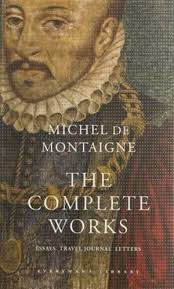Essays of Michel de Montaigne Page #21
The Essays of Michel de Montaigne are contained in three books and 107 chapters of varying length. They were originally written in Middle French and were originally published in the Kingdom of France.
And the other, why he should attempt to kill him? “Because,” said he, “I could think of no other remedy against thy perpetual mischiefs.” --[Tacitus, Annal., xv. 67.]--But the public and universal testimonies that were given of him after his death (and so will be to all posterity, both of him and all other wicked princes like him), of his tyrannies and abominable deportment, who, of a sound judgment, can reprove them? I am scandalised, that in so sacred a government as that of the Lacedaemonians there should be mixed so hypocritical a ceremony at the interment of their kings; where all their confederates and neighbours, and all sorts and degrees of men and women, as well as their slaves, cut and slashed their foreheads in token of sorrow, repeating in their cries and lamentations that that king (let him have been as wicked as the devil) was the best that ever they had;--[Herodotus, vi. 68.]--by this means attributing to his quality the praise that only belongs to merit, and that of right is due to supreme desert, though lodged in the lowest and most inferior subject. Aristotle, who will still have a hand in everything, makes a ‘quaere’ upon the saying of Solon, that none can be said to be happy until he is dead: “whether, then, he who has lived and died according to his heart’s desire, if he have left an ill repute behind him, and that his posterity be miserable, can be said to be happy?” Whilst we have life and motion, we convey ourselves by fancy and preoccupation, whither and to what we please; but once out of being, we have no more any manner of communication with that which is, and it had therefore been better said by Solon that man is never happy, because never so, till he is no more. “Quisquam Vix radicitus e vita se tollit, et eicit; Sed facit esse sui quiddam super inscius ipse, Nec removet satis a projecto corpore sese, et Vindicat.” [“Scarcely one man can, even in dying, wholly detach himself from the idea of life; in his ignorance he must needs imagine that there is in him something that survives him, and cannot sufficiently separate or emancipate himself from his remains” --Lucretius, iii. 890.] Bertrand de Guesclin, dying at the siege of the Castle of Rancon, near unto Puy, in Auvergne, the besieged were afterwards, upon surrender, enjoined to lay down the keys of the place upon the corpse of the dead general. Bartolommeo d’Alviano, the Venetian General, happening to die in the service of the Republic in Brescia, and his corpse being to be carried through the territory of Verona, an enemy’s country, most of the army were inclined to demand safe-conduct from the Veronese; but Theodoro Trivulzio opposed the motion, rather choosing to make his way by force of arms, and to run the hazard of a battle, saying it was by no means fit that he who in his life was never afraid of his enemies should seem to apprehend them when he was dead. In truth, in affairs of the same nature, by the Greek laws, he who made suit to an enemy for a body to give it burial renounced his victory, and had no more right to erect a trophy, and he to whom such suit was made was reputed victor. By this means it was that Nicias lost the advantage he had visibly obtained over the Corinthians, and that Agesilaus, on the contrary, assured that which he had before very doubtfully gained over the Boeotians.--[Plutarch, Life of Nicias, c. ii.; Life of Agesilaus, c. vi.] These things might appear strange, had it not been a general practice in all ages not only to extend the concern of ourselves beyond this life, but, moreover, to fancy that the favour of Heaven does not only very often accompany us to the grave, but has also, even after life, a concern for our ashes. Of which there are so many ancient examples (to say nothing of those of our own observation), that it is not necessary I should longer insist upon it. Edward I., King of England, having in the long wars betwixt him and Robert, King of Scotland, had experience of how great importance his own immediate presence was to the success of his affairs, having ever been victorious in whatever he undertook in his own person, when he came to die, bound his son in a solemn oath that, so soon as he should be dead he should boil his body till the flesh parted from the bones, and bury the flesh, reserving the bones to carry continually with him in his army, so often as he should be obliged to go against the Scots, as if destiny had inevitably attached victory, even to his remains. John Zisca, the same who, to vindication of Wicliffe’s heresies, troubled the Bohemian state, left order that they should flay him after his death, and of his skin make a drum to carry in the war against his enemies, fancying it would contribute to the continuation of the successes he had always obtained in the wars against them. In like manner certain of the Indians, in their battles with the Spaniards, carried with them the bones of one of their captains, in consideration of the victories they had formerly obtained under his conduct. And other people of the same New World carry about with them, in their wars, the relics of valiant men who have died in battle, to incite their courage and advance their fortune. Of which examples the first reserve nothing for the tomb but the reputation they have acquired by their former achievements, but these attribute to them a certain present and active power. The proceeding of Captain Bayard is of a better composition, who finding himself wounded to death with an harquebuss shot, and being importuned to retire out of the fight, made answer that he would not begin at the last gasp to turn his back to the enemy, and accordingly still fought on, till feeling himself too faint and no longer able to sit on his horse, he commanded his steward to set him down at the foot of a tree, but so that he might die with his face towards the enemy, which he did. I must yet add another example, equally remarkable for the present consideration with any of the former. The Emperor Maximilian, great-grandfather to the now King Philip,--[Philip II. of Spain.]--was a prince endowed throughout with great and extraordinary qualities, and amongst the rest with a singular beauty of person, but had withal a humour very contrary to that of other princes, who for the despatch of their most important affairs convert their close-stool into a chair of State, which was, that he would never permit any of his bedchamber, how familiar soever, to see him in that posture, and would steal aside to make water as religiously as a virgin, shy to discover to his physician or any other whomsoever those parts that we are accustomed to conceal. I myself, who have so impudent a way of talking, am, nevertheless, naturally so modest this way, that unless at the importunity of necessity or pleasure, I scarcely ever communicate to the sight of any either those parts or actions that custom orders us to conceal, wherein I suffer more constraint than I conceive is very well becoming a man, especially of my profession. But he nourished this modest humour to such a degree of superstition as to give express orders in his last will that they should put him on drawers so soon as he should be dead; to which, methinks, he would have done well to have added that he should be blindfolded, too, that put them on. The charge that Cyrus left with his children, that neither they, nor any other, should either see or touch his body after the soul was departed from it,--[Xenophon, Cyropedia, viii. 7.]--I attribute to some superstitious devotion of his; for both his historian and himself, amongst their great qualities, marked the whole course of their lives with a singular respect and reverence to religion.
Translation
Translate and read this book in other languages:
Select another language:
- - Select -
- 简体中文 (Chinese - Simplified)
- 繁體中文 (Chinese - Traditional)
- Español (Spanish)
- Esperanto (Esperanto)
- 日本語 (Japanese)
- Português (Portuguese)
- Deutsch (German)
- العربية (Arabic)
- Français (French)
- Русский (Russian)
- ಕನ್ನಡ (Kannada)
- 한국어 (Korean)
- עברית (Hebrew)
- Gaeilge (Irish)
- Українська (Ukrainian)
- اردو (Urdu)
- Magyar (Hungarian)
- मानक हिन्दी (Hindi)
- Indonesia (Indonesian)
- Italiano (Italian)
- தமிழ் (Tamil)
- Türkçe (Turkish)
- తెలుగు (Telugu)
- ภาษาไทย (Thai)
- Tiếng Việt (Vietnamese)
- Čeština (Czech)
- Polski (Polish)
- Bahasa Indonesia (Indonesian)
- Românește (Romanian)
- Nederlands (Dutch)
- Ελληνικά (Greek)
- Latinum (Latin)
- Svenska (Swedish)
- Dansk (Danish)
- Suomi (Finnish)
- فارسی (Persian)
- ייִדיש (Yiddish)
- հայերեն (Armenian)
- Norsk (Norwegian)
- English (English)
Citation
Use the citation below to add this book to your bibliography:
Style:MLAChicagoAPA
"Essays of Michel de Montaigne Books." Literature.com. STANDS4 LLC, 2024. Web. 30 Dec. 2024. <https://www.literature.com/book/essays_of_michel_de_montaigne_263>.




Discuss this Essays of Michel de Montaigne book with the community:
Report Comment
We're doing our best to make sure our content is useful, accurate and safe.
If by any chance you spot an inappropriate comment while navigating through our website please use this form to let us know, and we'll take care of it shortly.
Attachment
You need to be logged in to favorite.
Log In